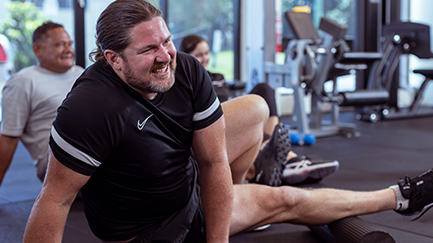
Supporting veterans through service related injuries
The Mates4Mates physical rehabilitation team is here to help veterans improve mobility, manage pain and enhance their overall wellbeing.

Our mental wellbeing, or our mental state, enables us to cope with the stresses of everyday life. There are many things in life that can impact our mental wellbeing in a positive or a negative way.
Positive mental wellbeing vs. negative mental wellbeing
Positive mental wellbeing refers to a person’s normal range of emotional, cognitive and behavioural functioning. It is expected that our emotions will fluctuate day-to-day in response to situational triggers; however, to maintain a ‘positive’ mental state, this fluctuation would remain within normal parameters or our ‘window of tolerance’.
Being in a positive mental state can look different for everyone, but generally, positive mental wellbeing would mean the person can respond to situations with a proportionate and reasonable level of emotions.
For example, if you are running late to an appointment and feel slightly more anxious as a result, this would be an appropriate response to the situation. However, if you notice that you are becoming very anxious or showing signs of panic, this could be considered disproportionate. If these responses to everyday situations are repeatedly different to your normal, are disproportionate in intensity, or last longer than what is reasonable, you may be experiencing negative mental wellbeing.
Veterans and external influences
External influences are everything that occurs outside of ourselves or things we cannot control, including what’s in the news, other people’s choices, or other drivers on the road.
For many veterans, external influences can trigger complex emotions and certain behavioural responses. A common experience of external influences in the Defence community is interacting with civilians. Some veterans can feel they cannot relate to civilians as they have different understandings of the world and how to navigate it.
This external influence of civilians with different societal beliefs can lead to feelings of isolation, frustration, and resentment. Often, this leads to an urge to avoid these situations rather than learn to navigate them for future interactions.
As much as we might try, we cannot always avoid these external influences that trigger us. That is why it is important to learn which of these influences bring about negative responses and how we would like to respond instead.
Working through instant reactions to external influences
It is important to know that while we are always exposed to external influences, we can learn to not instinctually react to them, and instead respond with choice and intention. Some simple ways to work toward this include:
Support at Mates4Mates
Mates4Mates offer a range of clinical support services to veterans and family members, including appointments with psychologists, counsellors and social workers. If you are looking to explore what may be happening and why these external influences are providing a trigger for you, our clinical team are here to help.
Connecting with others also has a profoundly positive impact on our wellbeing. Joining in on a Mates4Mates social connection offers veterans and their families the opportunity to connect with others in the Defence community who may share similar experiences.
To find out more about how Mates4Mates can support you, reach out on 1300 4 MATES (62 837) for a confidential chat.
Written by Jonathan Moscrop, Mates4Mates Psychologist and Clinical Lead - Psychological Services

The Mates4Mates physical rehabilitation team is here to help veterans improve mobility, manage pain and enhance their overall wellbeing.